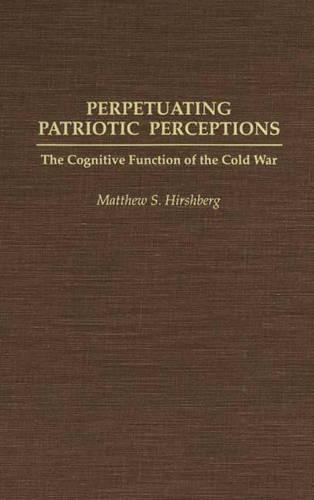
Perpetuating Patriotic Perceptions: The Cognitive Function of the Cold War
(Hardback)
Publishing Details
Perpetuating Patriotic Perceptions: The Cognitive Function of the Cold War
By (Author) Mathew S. Hirshberg
Bloomsbury Publishing PLC
Praeger Publishers Inc
30th January 1993
United States
Classifications
Tertiary Education
Non Fiction
Political science and theory
Cultural studies
327.1
Physical Properties
Hardback
248
Width 156mm, Height 235mm
539g
Description
The main point of this book is that biased perceptions of international relations are anchored in a nation's collectively held patriotic self-image, and that these biased international perceptions serve to bolster and perpetuate the patriotic beliefs upon which they are based. This book explores the cognitive structures and processes through which this occurs. Theories and methods from the fields of social and cognitive psychology, cultural anthropology and communication studies are combined to create a useful framework for the analysis of international perceptions. This framework is then applied to American beliefs and perceptions in the post-World War II era. Hirshberg claims that an "American patriotic schema" has been a long-standing, stable and pervasive fundamental belief system in American culture, and a "Cold War schema" extended the patriotic schema into world affairs after World War II. He argues that the American patriotic schema is tied in an interactive fashion with ongoing perceptions of international relations. Ultimately, stable, patriotic public perceptions of national greatness and governmental legitimacy function to ensure a supportive and acquiescent public. This helps secure America's impressive level of political stability. This book aims to be of broad interest to those political scientists and psychologists in the general field of political psychology.
Reviews
His phenomenological emphasis-that the Cold War persisted as long as Americans perceived it to exist and thought in Cold War terms-makes this work of most interest to sociopsychological and public policy studies. For advanced undergraduates through faculty.-Choice
"His phenomenological emphasis-that the Cold War persisted as long as Americans perceived it to exist and thought in Cold War terms-makes this work of most interest to sociopsychological and public policy studies. For advanced undergraduates through faculty."-Choice
Author Bio
MATTHEW S. HIRSHBERG is a Lecturer at the University of Canterbury in Christchurch, New Zealand.
